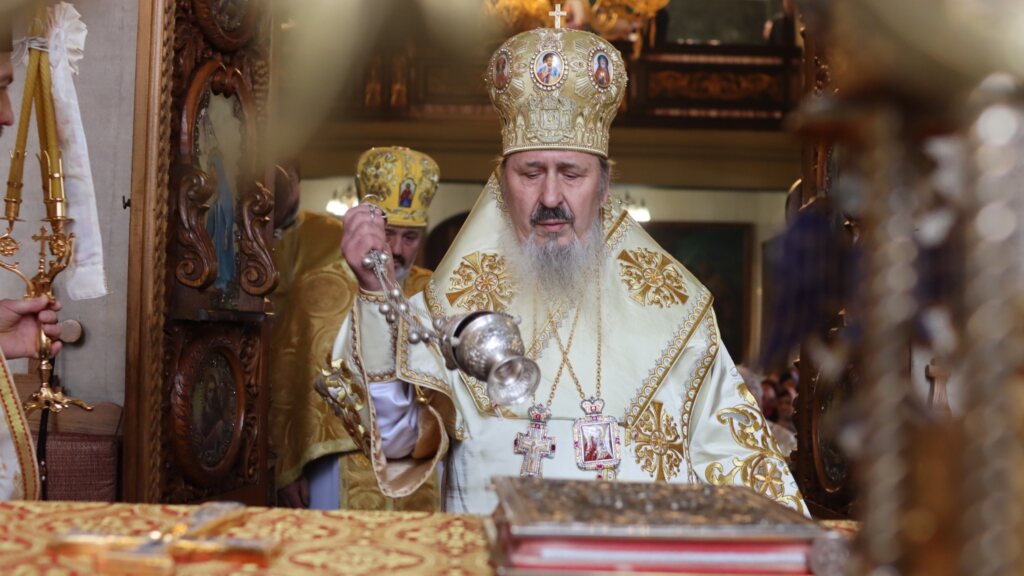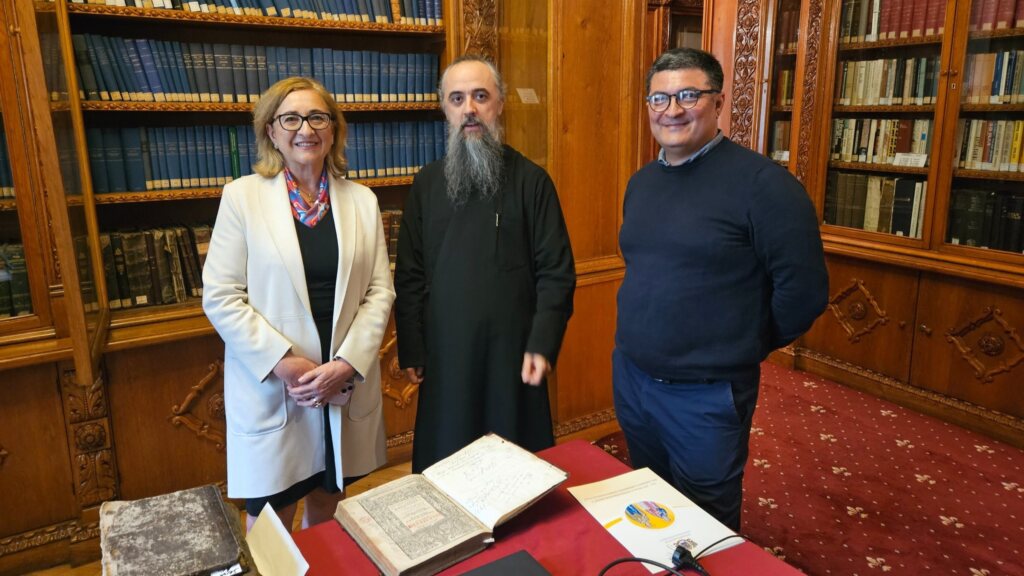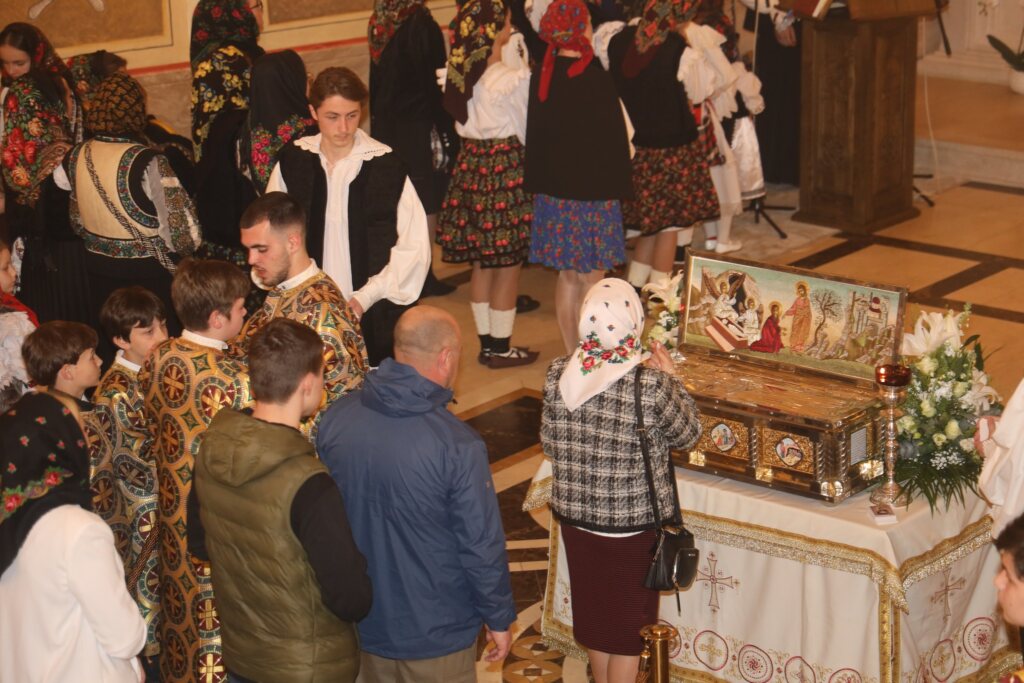Orthodox Calendar February 13
Venerable Martinian of Caesarea, in Palestine
Saint Martinian went to live in the wilderness at the age of eighteen, not far from the city of Caesarea in Palestine.
For twenty-five years, he devoted himself to ascetic deeds and silence, and he was granted the gift of healing illnesses and casting out demons. However, the Enemy of the race of man would not stop bothering the hermit with various temptations.
Once a profligate woman made a wager with some dissolute people that she could seduce Saint Martinian, the fame of whose virtuous life had spread throughout all the city. She came to him one night pretending that she had lost her way in the storm and asking for shelter. The saint let her enter, unable to turn her away in such a storm. He went into his room and locked the door.
The wicked guest changed into beautiful clothes and began to tempt the ascetic.
When morning came, Saint Martinian came out to send the woman away. Though he was tempted by the woman’s beauty, he was determined not to fall into sin. Lighting a fire, he stepped into it, saying, “You want me to burn with temptation, and want to lead me into the fires of Hell. I will not let you. Instead, I will burn for my virginity and save my soul.”The woman came to see how evil she was. She repented and asked the saint to guide her onto the way of salvation. He told her to go to Bethlehem, to Saint Paula (January 26). There she lived as a nun for twelve years in strict asceticism until her blessed end. The woman’s name was Zoe.
Saint Martinian went to an uninhabited rocky island, and lived on it under the open sky for several years, nourished by the provisions brought by a certain sailor from time to time. In return, the monk wove baskets for him.
Once a powerful storm wrecked a ship, and a woman named Photina floated on pieces of the wreckage to the island of Saint Martinian. Saint Martinian helped her to survive the island. “Remain here,” he told her, “for here is bread and water, and in two months a boat will come.”
Then he jumped into the sea and swam off. Two dolphins carried him to dry land. Thereafter, Saint Martinian led the life of a wanderer. Later, he came to Athens and fell ill. Sensing the approach of death, he went into church and lay upon the floor. God revealed to the Bishop of Athens who Saint Martinian was, and the bishop buried his body with honor. This occurred around the year 422.
Troparion — Tone 8
You quenched the flames of passion, blessed Martinian, with abundant tears; / you calmed the waves of the sea and checked the assaults of wild beasts, saying: / “Almighty God, You are most glorious, for You have saved me from the fire and storm!”
Saint Aquila, Apostle of the 70
It is possible that he was a disciple of the Apostle Paul, a native of Pontus and a Jew, living in the city of Rome with his wife Priscilla (they are commemorated on February 13 on the Greek Calendar). During the reign of the emperor Claudius (41-54) all the Jews were banished from Rome, so Saint Aquilla and his wife were compelled to leave. They settled in Corinth. A short while later, the holy Apostle Paul arrived there from Athens preaching the Gospel. Having made the acquaintance of Aquila, he began to live at his house and labored together with him, making tents.
Having received Baptism from the Apostle Paul, Aquila and Priscilla bacame his devoted and zealous disciples. They accompanied the apostle to Ephesus. The Apostle Paul instructed them to continue the preaching of the Gospel at Ephesus, and he himself went to Jerusalem, in order to be present for the feast of Pentecost. At Ephesus, Aquila and Priscilla heard the bold preaching of a newcomer from Alexandria, the Jew Apollos. He had been instructed in the fundamentals of the Faith, but knew only the baptism of John the Forerunner. They called him over and explained more precisely about the way of the Lord.
After the death of the emperor Claudius, Jews were permitted to return to Italy, and Aquila and Priscilla then returned to Rome. The Apostle Paul in his Epistle to the Romans recalls his faithful disciples, “Greet Priscilla and Aquila, my coworkers in Christ Jesus, who put forth their heads for my soul, whom I do not alone thank, but also all the Church of the Gentiles and the church of their household” (Rom. 16: 3-4).
Saint Aquila did not long dwell in Rome: the Apostle Paul made him a bishop in Asia. Saint Aquila zealously laboured at preaching the Gospel in Asia, Achaia and Heraklia. He converted pagans to Christ, he confirmed newly-converted Christians in the faith, he established presbyters and destroyed idols.
Saint Priscilla constantly assisted him in the apostolic work. Saint Aquila ended his life a martyr: pagans murdered him. According to the Tradition of the Church, Saint Priscilla was killed together with him.







